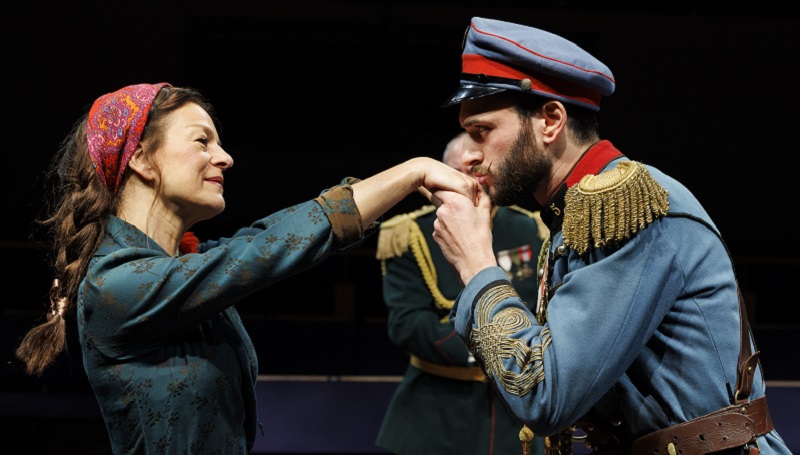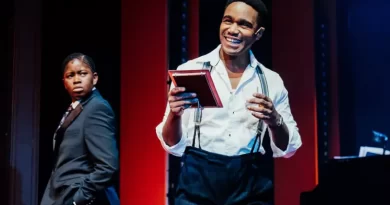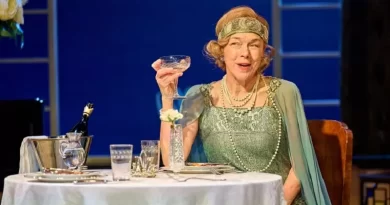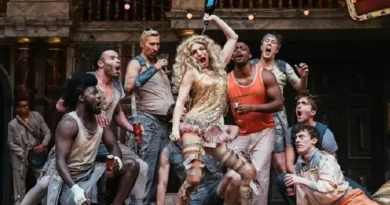“Arms and the Man”, Orange Tree Theatre
Simon Jenner in south-west London
25 November 2022
Talk about art aspiring to the condition of music. Shaw the music critic declared of his 1894 play Arms and the Man: “The four principals should be soprano, alto, tenor and bass.”
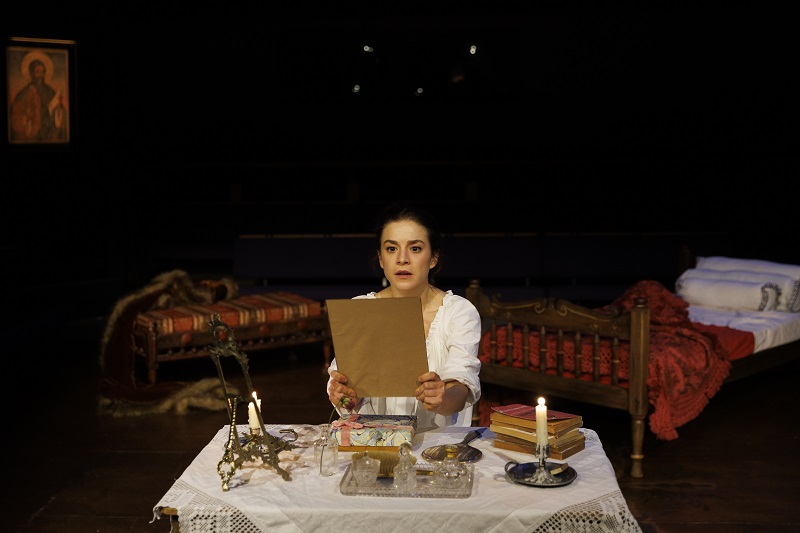
Rebecca Collingwood as Raina.
Photo credit: Ellie Kurtzz.
Paul Miller’s final production as director – before he steps down altogether from helming the Orange Tree Theatre – returns to his beloved early Shaw, and ensures his finale is as opera buffa as it gets. A production riotously comic with struck attitudes Shaw’s determined to strike down here gets a choreographed farce of flounces, mock-heroics, and sucking of feathers. Mostly from a heroic major who declares: “I never withdraw!” I’ve rarely heard such repeated laughter in the Orange Tree, a house hardly immune to it.
Despite that double-entendre, this work from the “Plays Pleasant” collection was almost the first Shaw got past the censor: others were published but banned from performance.
It’s also far edgier than it appears. The mysterious enemy fugitive who breaks into a young woman’s bedroom describes what we would now call PTSD in detail Shaw took care to gather; and later this man describes a friend’s fate. Shaw doesn’t flinch from describing how six wounded burn to death. The setting, Bulgaria, despite being exotically remote, is described closely.

Alex Bhat and Kemi Awoderu.
Photo credit: Ellie Kurtzz.
It is also far funnier. This isn’t just a dissection of the idiocies of war, but of class. So one couple have orchestrated love in a set of hyperbolic arias as they play at being in love because they seem so perfectly suited; in fact such hyperbolic expression – comic as it is to us – strains and even alienates the beautiful soprano and dashing tenor. Similarly, two servants seem sorted, but the soubrette alto has class aspirations which would infuriate the British let alone the basso factotum.
Late November 1885. In a bedroom with bed, dressing-table, and curtained window – first of three flexible sets designed by Simon Daw – the young woman, Raina (Rebecca Collingwood), self-delights in front of a mirror with a photograph of her betrothed, to the fussing of her equally romanticizing mother Catherine (Miranda Foster), as she dilates on the young hero’s exploits.
Moments after Catherine exits a fugitive, later identified as Bluntschli (Alex Waldmann), breaks in brandishing a pistol. He’s fighting for the enemy Serbs, though it turns out he is the one Swiss professional – in fact the one officer anywhere with military sense. The mad Bulgarians cavalry charged their machine-guns, which luckily for the Serbs jammed. The maddest of all the horsemen turns out to be Raina’s betrothed. Raina’s shocked by the fugitive’s description of him as a military idiot first class and bar.
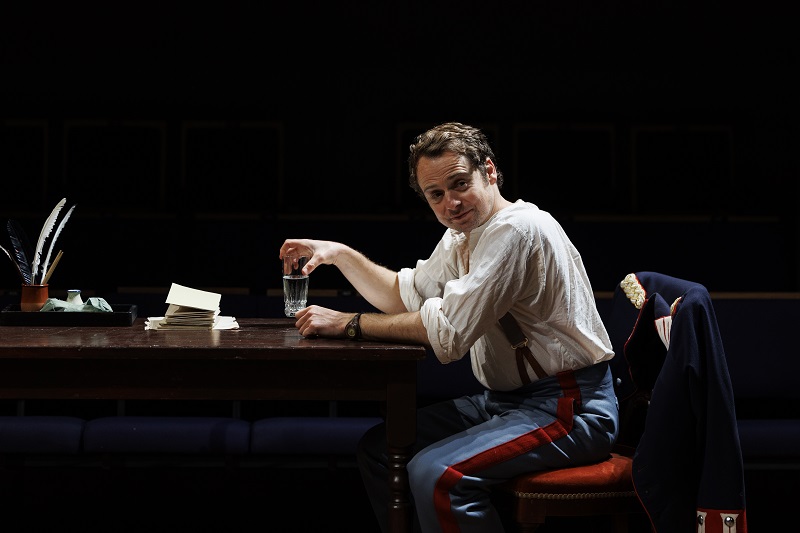
Alex Waldmann as Bluntschli.
Photo credit: Ellie Kurtzz.
Waldmann swiftly dispatches desperation for urbanity but never the shadow of trauma – it’ll take more than a wiping-off of blood. Despite dispatching Shavian sparks, he allows wells of darkness to gather. His chief challenge is to insinuate the way he’s wrong-footed into expressing his passion which Waldmann manages with grace and aplomb.
Collingwood’s Raina is delightful, witty, imperious, and a bit melting when not faux-swooning as she thinks she ought to. Raina isn’t yet the commanding Shavian heroine of later plays: still prone to illusion and role-play, it takes Bluntschli in Act II – where various characters are stripped of illusions – to make Raina see herself. To balance, Bluntschli too has one, dispatched at the end.
Needless to say this being Shaw Raina helps the as-yet-unnamed officer hide and offers cream chocolates. They’re what he carries instead of bullets: far more practical. Despite a Russian officer’s searches (Jonah Russell’s first very brief role) he’s safe, and we fast-forward in Act II to a garden and his reappearance in March 1886.
After the tenebrous bedroom of Act I we’re in bright day, a dazzling outside or merely bright indoors, Mark Doubleday’s lighting marking the difference. The whole act’s devoted to duets where ambitious young Louka (Kemi Awoderu) declares Nicola (Jonah Russell) will always be a servant. He, a realist who never undergoes change but realizes his ambitions, pivots the others’ ambitions and delusions. Russell makes much of his downright command of detail, where Awoderu puckers defiance, reasons with ebullient scorn, and knows far more how to make a bid for someone she likes better. It’s thrilling to see Shaw break with not only nineteenth-century but operatic convention where the soubrette can seduce the tenor.
That heldentenor Sergius (Alex Bhat) is almost the comic masterpiece of Miller’s production. Literally: he seems like a fantastical waxwork come to life in sky-blue jacket – the period dresses are enchanting throughout, notably Collingwood’s parasol-twirling white day clothes. Except that Bhat’s operatic flounces, flourishes, and absurdities are so exquisitely exaggerated – always truthful to their particular absurdity – that you almost feel for Sergius. He is in abject enslavement to Louka, while his irritating aria-topping moments with Raina where they outstrip each other in hyperbole (which in fact damage their relationship) show how they know neither themselves nor each other. Bhat’s sucking on a feather as Sergius and Bluntschli work on military logistics – the Swiss now recruited into making sense of his once enemy army – is just one camp joke to stamp Bhat’s bon-bon magnificence. And there’s always “I never withdraw!” which even an 1894 audience must have picked up the third time.
By now we’re in the library (just one bookcase as Shaw directs, beautifully detailed here in real Bulgarian labels) where sparring and challenges meet across a mapped-desk and the small sweep gives on to class revolution. Elizabeth Purnell’s composition and sound pivots around Mahler’s Symphony No. 1, which by 1894 had had a few outings.
The brilliance of Miller’s sixth and final Shaw here, though, is naturally the balance of extremes: where homely old Major Petkoff (Jonathan Tafler) dispatches his wife to deal with the army and his one-time foe to sort out how that army will function. Tafler’s exquisite bumbling on the margins fits like the comfortable coat he’s finally able to wear after it’s been on some surprising travels of its own.
Foster’s Catherine too shows in her mix of materialist delight (a new electric bell) and hidebound class scorn a sexual flutter of her own towards both young men. Except when they unexpectedly return and ring other bells. Elsewhere, Russell’s Nicola also acquires expectations but like them doesn’t alter. Bhat’s and Collingwood’s characters are pushed into different levels of self-realization (Raina more so, and Collingwood registers this), whilst Waldmann’s Bluntschli and Awoderu’s Louka, realists who know what they want, encounter more than they expected – yet in these performances triumph with the sense of having fought with lucidity and passion.
This is the Arms and the Man for our times. Echoes of other conflicts are allowed to land precisely because Shaw wrote them in to speak for all wars; Waldmann in particular speaks them clearly to our condition. There’s no strain but there is a great music and a surprisingly abrupt Shavian denouement, which Miller and his team convey with uproarious wit and no lack of warmth. Outstanding and a superb fermata to Miller’s time at the Orange Tree.

